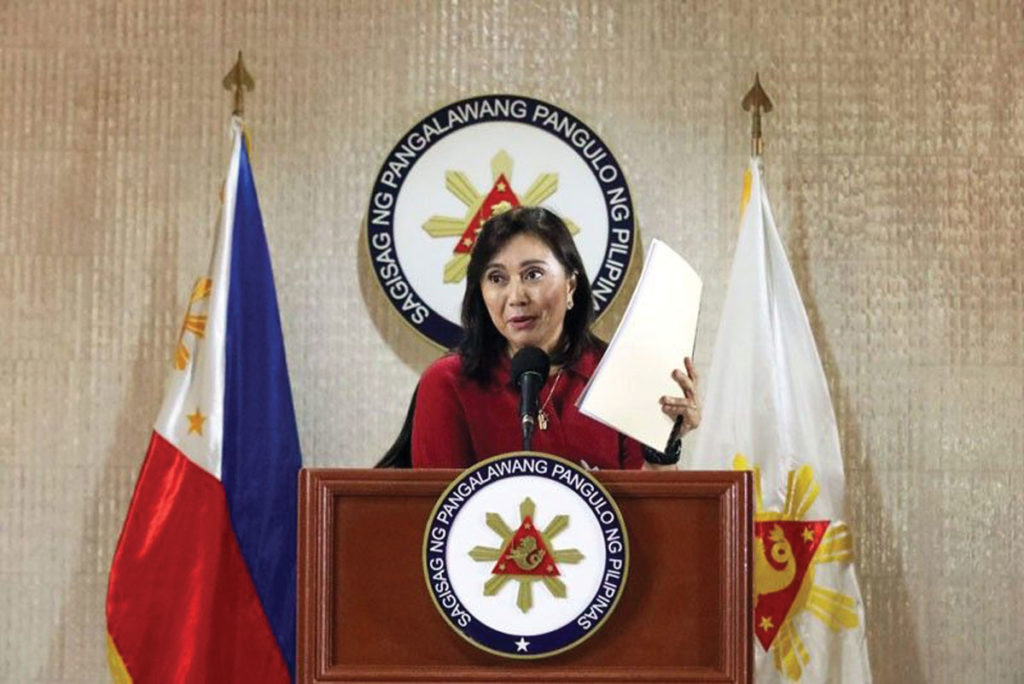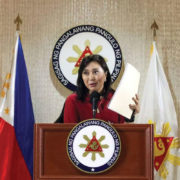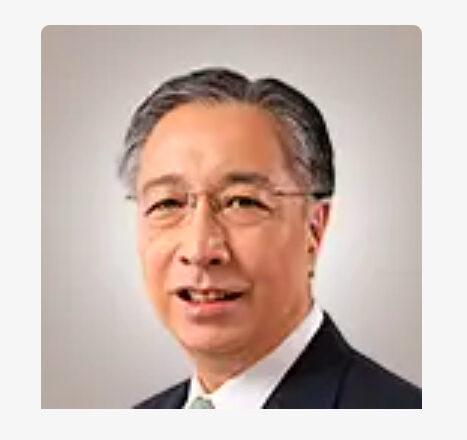
PHILIPPINE President Rodrigo Duterte on Tuesday, January 7 dismissed Vice President Leni Robredo’s published report that called the administration’s three-year war against illegal drugs a “massive failure.”
This comes after the vice president on Monday released her long-awaited report on the situation of the anti-drug campaign based on her 18-day stint as the Inter-Agency Committee on Anti-Illegal Drugs co-chair.
“For all of these years she has done nothing. She is a colossal blunder. Colossal blunder,” Duterte told reporters at Malacañang, urging her to look at her “record” for the past three years in office.
Of the report, he said, “She can’t lecture me on what to do. She has been there how many days? Seventeen or 18 days.”
In her 40-page report, the vice president claimed that the administration has barely scratched the surface of the Philippines’ drug problem despite all the money and resources put toward the campaign.
She was fired by Duterte from her ICAD post last year for several reasons, including the lack of trust and for allegedly consulting foreign groups about the situation.
“Through the presentation of the findings and recommendations contained in this report, the hope is for our focus to be directed to the true and common enemy: the continued proliferation of illegal drugs that destroys the lives and futures of many Filipino families,” Robredo said.
If the drug war were an exam, the administration would have scored poorly at 1/100 as only 1% of the total shabu circulating in the country has been recovered between 2017 and 2018, according to the report.
“Supply constriction, as an aspect of the overall strategy against illegal drugs, has been a massive failure,” it added.
Citing data from the Drug Enforcement Group of the Philippine National Police (PNP), drug users consume 3,000 kilograms of shabu per week or 156,000 kilograms per year.
However, Robredo pointed out that the same data revealed the government only managed to seize 1,344.87 kilograms in 2019, 785.31 kilograms in 2018, and 1,053.91 kilograms in 2017.
“PDEA [Philippine Drug Enforcement Agency] only recovered up to 1% of the total shabu supply in the past three years. That amount of drugs is worth billions of pesos,” she noted.
In a press conference on Monday, Robredo suggested that the campaign focus should be on bigger drug trade players instead of the everyday user.
“If we really want to end the scourge of illegal drugs, we need to run after the big suppliers and not just the small-time pushers,” she said.
Furthermore, the report founded that the Anti-Money Laundering Council (AMLC) was only able to recover P1.4 billion of drug assets.
“Three kilograms of shabu (is) worth P25 billion per week, which means P1.3 trillion of shabu are being distributed around the country, but only P1.4 billion was restricted by AMLC, not even 1% of all the money that is revolving in the drug trade,” Robredo said.
She called for a “change in strategy,” which included stopping Oplan Tokhang and releasing a new policy that has clearer objectives and operational guidelines to avoid the abuses associated with the campaign campaign.
Data from the Philippine National Police and PDEA released in December found that
an estimated 5,552 people had been killed during government operations between July 1, 2016, and November 30, 2019. However, human rights groups have pegged the death toll to around 27,000 as of last June.
The vice president also suggested transferring the chairmanship of the ICAD to the Dangerous Drugs Board (DDB), which would be “better equipped to plan an overall program.”
Duterte created the ICAD in 2017 under the chairmanship of the PDEA to lead the “effective conduct of anti-illegal drug operations and arrest of high-value drug personalities down to the street-level peddlers and users.”
“It (drug war) is a failure, there are so many aspects, and like what we said in the report, there is too much focus in the street level. Even if we do this every day and if we do not pay attention to supply constriction, then the problem would not end,” Robredo said.






